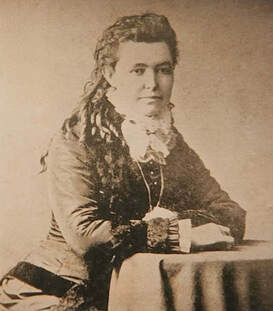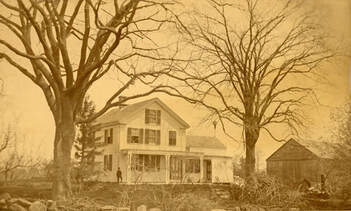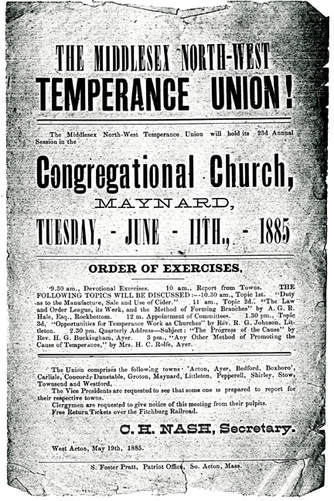 Clarissa (Hapgood) Nash Clarissa (Hapgood) Nash In discussions of notable citizens in a town’s history, women, whose roles in the community were usually less publicized, are often overlooked. Researching Acton women who stood out despite their limited opportunities led us to Clara (Hapgood) Nash, the first woman admitted to the bar in New England. Clara (born Clarissa) Hosmer Hapgood was the fifth child of John Hapgood and Mary Ann Hosmer, both Acton natives who lived for a time in Fitchburg where Clara was born on January 15, 1839. The young family returned to Acton in 1846. Clara and her surviving siblings David, Henry, Ephraim and Luke grew up on John’s farm on Central Street with many cousins living nearby. Clara attended Acton public schools and later studied at college-preparatory Peirce Academy in Middleboro. Clara started teaching in the Acton schools in the spring term of 1862. In the fall of that year, Clara’s brother Henry left with Acton’s Company E, Sixth Regiment to serve the Union cause. The Society is extremely fortunate to have been given letters between Henry and his family, including Clara. From them, we learn something about her life and personality. She was a busy young woman. She wrote to Henry about her school, her class of 49 students (or more), and the pressure of end-of-term oral examinations that were open to the public. In addition to teaching, she supported the temperance cause and became editor of the pro-temperance publication “The Crystal Font.” In her free time, she attended lectures and at least one teachers’ conference and visited with friends and family.  Hapgood / Nash House Hapgood / Nash House The letters show that Clara’s family was close-knit and caring. Clara wrote to Henry about their parting (September 27, 1862): “Do you remember our last meeting at the school house? Well when I went back into school I had a little cry and before I got over it in came Mr. Norten to visit the school and soon after I called the school to order some one rapped and who should appear at the door but Mr. Richardson [the superintendent]. .... So you see I had to muster all the dignity I was capable of notwithstanding my sadness.” Clara also wrote about having to teach her school after a cousin brought her a letter from Henry in September 1862. She was impatient to read his letter, because “we are so anxious constantly.” Later letters mention sending foodstuff and supplies to Henry, with Clara reminiscing about her own pleasure in receiving items from home when she was studying in Middleboro (October 30, 1862). Clara taught in the West Acton school, teaching the higher department in the 1862 spring and fall terms (that evidently included her younger brothers) and the primary department in the winter. She was paid $18 per month (School Report 1862-1863, page 33). As was customary at the time, male scholars were brought in to teach in the winter term when “big boys,” otherwise needed for farm work, joined the classes. Mr. W. E. Eaton took over the higher department at West Acton. Frederick C. Nash, from Tufts College, taught the higher department of the South Acton School for two winter terms (1861-1862 and 1862-1863). The winter-term men were paid $40 monthly. Pay inequality was rampant at the time, but the men were also paid a premium for handling what was considered a harder assignment. Clara and Frederick C. Nash met and obviously found that they had common interests. Her brother Luke commented in a letter (December 21, 1862): “Henry who do you suppose is in the parlor? I will tell you it is Mr. F. C. Nash teacher of So. Acton School. He was here last Sunday night and several other nights has been home with Clara from the Lyceum & Sons of Temperance she went with him to Concord last Wednesday night to hear H. W. Beecher, Lecture before the Lyceum.... dont tell Clara that I told about Mr Nash for if you do perhaps I would get an old fashioned Scotch blessing [a tongue lashing].” Clara’s teaching was reported on favorably in the 1862-1863 report (page 27). Her students did well in their final examinations, despite the fact, (disappointing to Clara), that in the winter term, some of her “best” pupils had the mumps at the time of the examination (Letter from David Hapgood, March 8, 1863). Clara taught the West Acton higher department again in the spring and fall of 1863. The fall term of 1863 must have been extremely difficult for the family; Henry was home from war in a very debilitated state. He wrote to his cousin Delette Hall in September 1863 that it was doubtful that he would recover, despite the best efforts of “Mother and a kind physician.” Clara’s health weakened as well. In the 1863-64 town report, George C. Wright of the local school committee wrote that: “Miss Hapgood commenced her labors with her accustomed zeal, and had it not been for her failing health, owing to too much care and anxiety on account of sickness at home, would have merited that approbation which she has always won.... We hope, after a rest to recruit mind and body, Miss Hapgood will again engage in the work of teaching, for which she is well fitted.” (page 30) Henry, unfortunately, did not survive his illness. One can only imagine how hard it was for the family. Eventually, Clara regained her health. Her father mentioned in an April 1864 letter that she was at school in New Ipswich, NH (apparently Appleton Academy). She was called to teach the upper department of the South Acton school in the winter of 1865-66. The school committee’s comment after that term was that “the school had flourished under her management.” (page 11) According to various biographical sketches (for example Who’s Who in New England, Vol. 1, 1909, page 679), Clara attended the State Normal School at Framingham, graduating from the advanced class, and later taught in high schools in Marlborough and Danvers. So far, Clara seemed like a typical woman of her time. Obviously intelligent, she followed the path available to her, going to a teacher’s college and teaching in local schools. She married Frederick Nash on January 1, 1869 in Acton. They moved to Columbia Falls, Maine where Frederick had grown up and established a law practice. For most women of Clara’s time, marriage would have been the end of her career. However, in Columbia Falls, Clara studied law in the office of her husband. (Law training was typically done with a practicing lawyer.) Starting in January, 1871, newspapers started reporting that Mrs. Clara Nash had become a justice of the peace after completing her law studies in her husband’s office. (At some point over the next few months, someone mistakenly changed her location to Columbia, NH, and that “news” spread across the country.) In 1872, Clara was examined by a committee in Machias, Maine. They unanimously agreed that she was qualified and formally admitted her to the Bar of the Supreme Judicial Court in Maine in October 1872, giving her full standing in the legal profession, a first for New England. Clara’s feat was widely reported in newspapers throughout the country. Clara and Frederick became partners in a law practice, first in Columbia Falls, then in Portland. According to the Bangor Daily Whig and Courier (1 November 1873), Clara made a stir by actually appearing in court in the case of John D. Allen v. Town of Jonesboro, presenting legal arguments with references from previous legal decisions and examining witnesses. Son Frederick was born in Portland, Maine on January 3, 1874. We do not have much specific information about Clara during the early years of his life, but she apparently juggled motherhood and legal work. She was listed as an attorney at law in the 1879 Portland, Maine directory with the firm of F. C. & C. H. Nash at 119 ½ Exchange. Surprisingly, the 1880 census reported that on June 9, Frederick and Clara Nash, both listed as lawyers, were with son Fred in Minneapolis. So far, we do not know why they were in the Midwest on that date. Shortly thereafter, the Nash family returned to Acton, taking up residence in the Hapgood farmhouse (at today’s address 149 Central Street). Frederick established a law practice in Boston and also was available for consultation at home in the evening and at South Acton before taking the train to the city. He also served as Acton’s Superintendent of Schools in the 1880s and was involved in other town matters including the formation of West Acton's Citizens' Library. Clara may have helped Frederick privately with his legal business, but she did not formally practice law in Massachusetts. (Her home state had not yet admitted a woman to the bar at the time the Nash family returned.) Clara used her energies in other ways and quickly found her place back in the community. She served as the first librarian of the Citizens’ Library in West Acton (for about two years starting in 1883, apparently without pay). Clara was also a temperance supporter as her family had been for many years. A copy of a broadside sent to the Historical Society shows that in 1885, she was the Secretary of the Middlesex North-West Temperance Union. She was very active in the Woman's Christian Temperance Union, (a group that coalesced over the issue of temperance and became a leading organization in the struggle for women’s and children’s rights). Clara served as the local Union’s president for 24 years and eventually was honored with a life membership in appreciation of her years of service. Clara was also noted as a poet. The poems contained bits of family and local history that we might otherwise have missed. Her style was of her time, but the emotions underlying her poems were universal. Clara put her feelings about parting with her soldier brother Henry into a poem that was later published as “Sister I Must Go.” “Song in Death” was written about the way he dealt with his final sickness. Many of her poems were written for the birthdays, anniversaries and funerals of family members and friends. At the dedication of Acton’s Memorial Library, Clara read a poem about Acton’s history that she had written for the occasion. Some of Clara’s poems were published in the Magazine of Poetry and Literary Review in 1894, and in 1909, a collection of her poetry was published as Verses by Cambridge University Press (Cambridge, MA). In 1917, her poem “Mother” was set to the music of E. S. Hosmer and turned into a four-part song.
Sometime around early 1915, Frederick and Clara moved from the old Hapgood farmhouse in Acton. In 1920, Frederick and Clara were living at 10 Oak Terrace in Newton. On February 18, 1921, Frederick C. Nash passed away. Clara followed him on March 5. They had both recently turned 82 years old and spent over fifty years together. They were buried in Mount Hope Cemetery with Clara’s parents and most of her siblings, not far from the home in which she was raised and where she and Frederick spent years of their adult lives. One of Clara’s poems was entitled “Woman’s Work,” the theme of which was women’s evolving and expanding roles, from women mentioned in the Bible to pioneers whom Clara clearly admired. Clara wrote (in part): She (Caroline Herschel, astronomer) solves the problem of the stars, And woman’s narrow bound unbars. By constant care and skill Through prejudicial woes, By woman’s strong, undaunted will The woman’s college rose. ... A voice breaks like a spell, To woman it rings clear: “Do what you can and do it well! Through out the so-called ‘sphere.’” ... Thus women stand to-day In pulpit, at the bar, In medicine with tender sway, Their influence widening far ... Clara wound up the poem by writing of women’s roles as caregivers from the birth of their children to the end of the lives of their loved-ones. She concluded with a call to women: Heaven’s high behest to heed, With ready sympathy to see Humanity’s sore need. And, seeing, haste to give redress, To right its wrongs, to cheer and bless. We would love to find out more about Clara (Hapgood) Nash and her family. If you know of any sources of information, documents, or photographs, we would be delighted to learn more. We are also looking for a full copy of E. S. Hosmer’s song “Mother” from 1917. Please contact us if you can help. Comments are closed.
|
Acton Historical Society
Discoveries, stories, and a few mysteries from our society's archives. CategoriesAll Acton Town History Arts Business & Industry Family History Items In Collection Military & Veteran Photographs Recreation & Clubs Schools |
Quick Links
|
Open Hours
Jenks Library:
Please contact us for an appointment or to ask your research questions. Hosmer House Museum: Open for special events. |
Contact
|
Copyright © 2024 Acton Historical Society, All Rights Reserved

 RSS Feed
RSS Feed